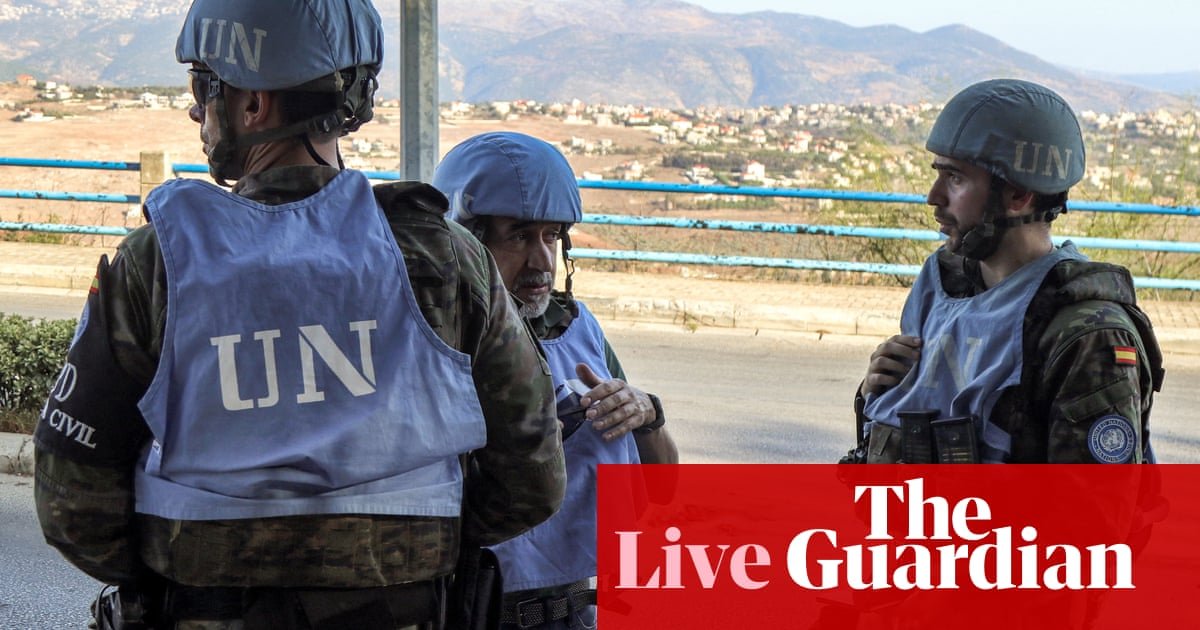
Peacekeepers in Lebanon ‘increasingly in jeopardy’, says UN
UN peacekeeping chief Jean-Pierre Lacroix has told the security council that the safety of more than 10,400 UN peacekeepers in Lebanon was “increasingly in jeopardy” and operations had virtually halted since late September, coinciding with Israel’s escalation against Hezbollah in Lebanon.
“Peacekeepers have been confined to their bases with significant periods of time in shelter,” he said, adding that the mission – known as Unifil – was ready to support all efforts towards a diplomatic solution.
His comments came after the UN peacekeeping mission in Lebanon said Israeli forces had deliberately fired on its positions, injuring two peacekeepers from Indonesia. Unifil called attacks on peacekeepers “a grave violation of international humanitarian law”.
The White House said the US was deeply concerned by those reports and was pressing Israel for details. Israel’s military said its troops operated in the Naqoura area, “next to a Unifil base”. “Accordingly, the IDF instructed the UN forces in the area to remain in protected spaces, following which the forces opened fire in the area,” Israel’s statement said, adding it maintains routine communication with Unifil.
The peacekeepers were determined to remain at their posts despite Israeli attacks and orders by Israel’s military to leave, said the UN force’s spokesperson, Andrea Tenenti. Its 50 contributing countries had agreed on Thursday to keep deploying more than 10,000 peacekeepers between the Litani River in the north and the UN-recognised boundary between Lebanon and Israel known as the Blue Line in the south.
“We are there because the [UN] security council has asked us to be there. So we are staying until the situation becomes impossible for us to operate,” Tenenti said.
In New York, Israel’s UN ambassador, Danny Danon, said Israel recommended Unifil relocate 5km north “to avoid danger as fighting intensifies”.
Key events
Al Jazeera reports a statement from the Iranian Red Crescent which claims Israel has struck its field hospital situated on the Lebanon-Syria border.
Pir Hossein Kolivand, head of the Iranian Red Crescent, is quoted as saying “Supplies, including food, medical items, and equipment, were stationed there, clearly marked with Red Crescent flags. It was evident from the air and the ground that the location was designated for healthcare services, emergency relief, and temporary shelter. Unfortunately, early this morning, the site was targeted by the Zionist regime. Everything was destroyed.”
The claims have not been independently verified.
CNN in the US is reporting that it has been briefed by an official that Israel’s security cabinet did not reach agreement on Thursday on how to attack Iran in response to the volley of missiles Tehran fired in a direct attack on Israel on 1 October. Those launches were, Iran said, a retaliation for the Israeli assassination of Hezbollah leader Hassan Nasrallah by Israel. Iran has vowed to respond to any Israeli attack.
Israeli media reports that a barrage of about 20 projectiles has been fired into Israel’s north-west from the direction of Lebanon, appearing to target the Acre and Krayot areas north of Haifa on the coast. There were no immediate reports of any casualties.
The National News Agency in Lebanon has carried an update from the country’s civil defense department on the search and rescue operation mounted in Beirut after an Israeli airstrike which, according to reports, killed at least 22 people and left 117 wounded.
The emergency services say that in addition to recovering bodies, they transported the injured to hospital and evacuated nearby buildings. They also worked to extinguish fires, and report that five people are still missing.
Israel’s army says it has killed Palestinian militant group Islamic Jihad’s top commander for the Nur Shams refugee camp in the occupied West Bank, AFP reports:
The military said Mohammad Abdullah was “eliminated” on Thursday after Israeli aircraft struck the camp in Tulkarem.
An additional “terrorist” was killed in the operation, which recovered M-16 rifles and vests, it added.
Abdullah was the successor of Muhammad Jabber, also known as Abu Shujaa, who was killed in an Israeli strike in late August.
Islamic Jihad is an ally of Hamas, with both groups battling Israeli forces in the West Bank and the Gaza Strip.
European Council president Charles Michel said an “attack” on UN peace operations was “not acceptable”, after peacekeepers said Israeli forces fired on their headquarters in south Lebanon, injuring two blue helmets from Indonesia.
“An attack against a UN peace mission is not responsible, is not acceptable and that’s why we call on Israel and we call on all sides to fully respect international humanitarian law,” he told AFP.
Michel joins a growing chorus of international leaders and member states who contribute troops to the UN interim force in Lebanon (Unifil), at a time Israel is already under scrutiny on multiple fronts for alleged war crimes and crimes against humanity.
Among the most vociferous was Italy, where defence minister Guido Crosetto said he has asked for a formal explanation from Israeli authorities on the attacks on Unifil bases, which he said “were not an accident nor a mistake”.
“We won’t accept the justification that Israeli military forces had previously alerted Unifil that some of its bases had to be abandoned,” he said.
Indonesia’s UN ambassador Hari Prabowo, meanwhile, said the incident “clearly demonstrates how Israel positioned itself above international law, above impunity and above our shared values of peace”.
UN peacekeeping chief Jean-Pierre Lacroix has told the security council that the safety of more than 10,400 UN peacekeepers in Lebanon was “increasingly in jeopardy” and operations had virtually halted since late September, coinciding with Israel’s escalation against Hezbollah in Lebanon.
“Peacekeepers have been confined to their bases with significant periods of time in shelter,” he said, adding that the mission – known as Unifil – was ready to support all efforts towards a diplomatic solution.
His comments came after the UN peacekeeping mission in Lebanon said Israeli forces had deliberately fired on its positions, injuring two peacekeepers from Indonesia. Unifil called attacks on peacekeepers “a grave violation of international humanitarian law”.
The White House said the US was deeply concerned by those reports and was pressing Israel for details. Israel’s military said its troops operated in the Naqoura area, “next to a Unifil base”. “Accordingly, the IDF instructed the UN forces in the area to remain in protected spaces, following which the forces opened fire in the area,” Israel’s statement said, adding it maintains routine communication with Unifil.
The peacekeepers were determined to remain at their posts despite Israeli attacks and orders by Israel’s military to leave, said the UN force’s spokesperson, Andrea Tenenti. Its 50 contributing countries had agreed on Thursday to keep deploying more than 10,000 peacekeepers between the Litani River in the north and the UN-recognised boundary between Lebanon and Israel known as the Blue Line in the south.
“We are there because the [UN] security council has asked us to be there. So we are staying until the situation becomes impossible for us to operate,” Tenenti said.
In New York, Israel’s UN ambassador, Danny Danon, said Israel recommended Unifil relocate 5km north “to avoid danger as fighting intensifies”.
Hello and welcome to the Guardian’s continuing coverage of the crisis in the Middle East.
The safety and security of UN peacekeepers in Lebanon are “increasingly in jeopardy” and operational activities have virtually come to a halt since since 23 September, UN peacekeeping chief Jean-Pierre Lacroix told the security council on Thursday evening.
“Peacekeepers have been confined to their bases with significant periods of time in shelter,” he said, adding that the mission – known as Unifil – was ready to support all efforts towards a diplomatic solution.
It comes after the UN peacekeeping mission in Lebanon said on Thursday that Israeli forces had deliberately fired on its positions, injuring two peacekeepers.
European Council president Charles Michel said the firing was “not responsible” and “not acceptable”.
More on that in a moment.
At least 22 people were killed and more than 100 others injured after Israeli airstrikes hit residential areas of central Beirut on Thursday evening. The strikes hit the working-class district of Basta and the Nweiri neighbourhood, the deadliest attacks to target central Beirut since Israel intensified its bombardment campaign on the country two weeks ago. Hezbollah’s Al Manar TV reported that the strikes were an attempt to assassinate Wafiq Safa, a top security official with the group, which it said had failed.
At least 28 people, including women and children, have been killed after an Israeli airstrike hit a school sheltering displaced people in central Gaza on Thursday morning. The Palestine Red Crescent Society (PRCS) said it had responded to 27 fatalities and 54 injuries after the strike on the school turned shelter in Deir al-Balah. The Israeli military said it targeted militants who were operating in the compound.
The Israeli military continued to push on with an offensive that began six days ago, when it sent its troops into Jabaliya, the largest of Gaza’s eight historic refugee camps and the nearby towns of Beit Hanoun and Beit Lahiya. Palestinian health officials say at least 130 people have been killed so far in the operation, which Israel says is aimed at preventing Hamas from regrouping. The military has told residents to evacuate an area in which the UN estimates more than 400,000 people are trapped.
Three hospitals in northern Gaza – Indonesian, Al-Awda and Kamal Adwan hospitals – have been ordered by Israeli forces to evacuate, putting patients’ lives at risk, medics say. The director of Kamal Adwan hospital n northern Gaza said eight patients, mostly children, were at risk inside the intensive care units should the Israeli army force them to evacuate. Israeli bombardment near Kamal Adwan hospital has already caused some damage to the facility, medics said. Officials said they know of many fatalities lying on the roads outside the hospital because of Israeli fire.
Philippe Lazzarini, the head of the UN Palestinian refugee agency, Unrwa, said some Unrwa shelters and services were being forced to shut down for the first time since the war began and that with almost no basic supplies available, hunger was spreading again in northern Gaza, amid witness accounts of bodies lying uncollected in the streets because of the renewed fighting.
EU chief Charles Michel says ‘attack’ on UN peacekeepers ‘not acceptable’
Peacekeepers in Lebanon ‘increasingly in jeopardy’, says UN
Welcome and summary






